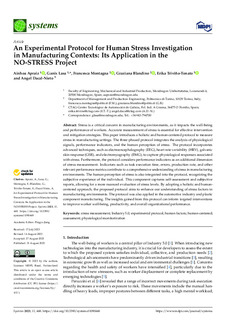Título
An Experimental Protocol for Human Stress Investigation in Manufacturing Contexts: Its Application in the NO-STRESS ProjectAutor-a (de otra institución)
Otras instituciones
CTAG Centro Tecnológico de Automoción de GaliciaVersión
Version publicada
Derechos
© 2023 The AuthorsAcceso
Acceso abiertoVersión del editor
https://doi.org/10.3390/systems11090448Publicado en
Systems Vol. 11. N. 9. N. Artículo 448. August, 2023Editor
MDPIPalabras clave
stress measurement
Industry 5.0
experimental protocol
human factors; ... [+]
Industry 5.0
experimental protocol
human factors; ... [+]
stress measurement
Industry 5.0
experimental protocol
human factors;
ODS 3 Salud y bienestar
ODS 8 Trabajo decente y crecimiento económico
ODS 9 Industria, innovación e infraestructura [-]
Industry 5.0
experimental protocol
human factors;
ODS 3 Salud y bienestar
ODS 8 Trabajo decente y crecimiento económico
ODS 9 Industria, innovación e infraestructura [-]
Resumen
Stress is a critical concern in manufacturing environments, as it impacts the well-being and performance of workers. Accurate measurement of stress is essential for effective intervention and mitigati ... [+]
Stress is a critical concern in manufacturing environments, as it impacts the well-being and performance of workers. Accurate measurement of stress is essential for effective intervention and mitigation strategies. This paper introduces a holistic and human-centered protocol to measure stress in manufacturing settings. The three-phased protocol integrates the analysis of physiological signals, performance indicators, and the human perception of stress. The protocol incorporates advanced techniques, such as electroencephalography (EEG), heart rate variability (HRV), galvanic skin response (GSR), and electromyography (EMG), to capture physiological responses associated with stress. Furthermore, the protocol considers performance indicators as an additional dimension of stress measurement. Indicators such as task execution time, errors, production rate, and other relevant performance metrics contribute to a comprehensive understanding of stress in manufacturing environments. The human perception of stress is also integrated into the protocol, recognizing the subjective experience of the individual. This component captures self-assessment and subjective reports, allowing for a more nuanced evaluation of stress levels. By adopting a holistic and human-centered approach, the proposed protocol aims to enhance our understanding of stress factors in manufacturing environments. The protocol was also applied in the automotive industry and plastic component manufacturing. The insights gained from this protocol can inform targeted interventions to improve worker well-being, productivity, and overall organizational performance. [-]
Financiador
European CommissionPrograma
EIT Manufacturing within the second Call for Innovation activities for the Business Plan 2023-2025Número
23472URI de la ayuda
Sin informaciónProyecto
Sin informaciónColecciones
- Artículos - Ingeniería [729]
El ítem tiene asociados los siguientes ficheros de licencia:






















